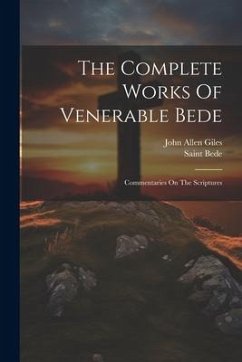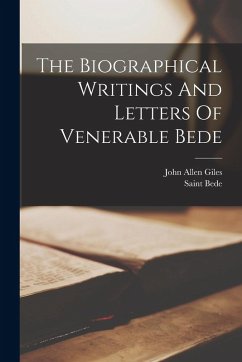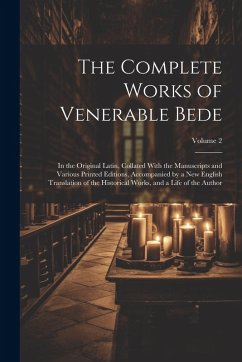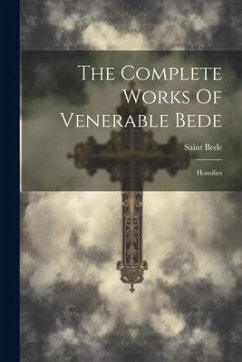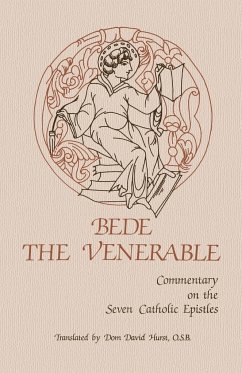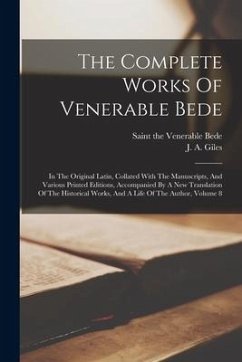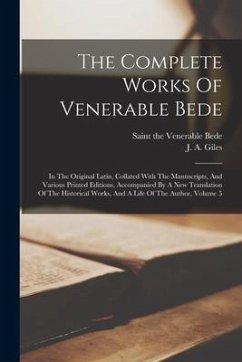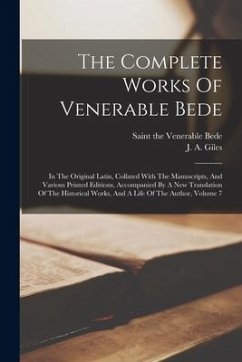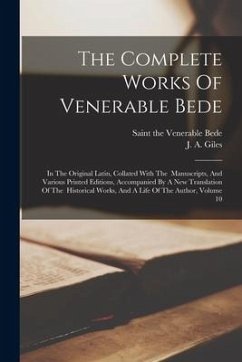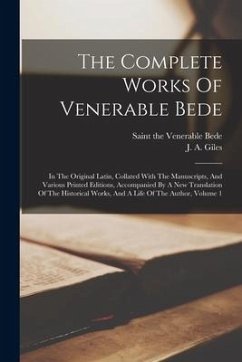Nicht lieferbar

A Complete Study of the Writings of St. Bede the Venerable
The Father of English History
Versandkostenfrei!
Nicht lieferbar
A Timeline of St. Bede's Life and Works St. Bede the Venerable's life, spanning the late 7th and early 8th centuries, is a remarkable testament to the vitality of monastic scholarship and spiritual devotion during a formative period in the history of the English Church. The following timeline highlights key events and milestones in Bede's life, alongside the creation of his most significant works. This chronology provides a framework for understanding the breadth of his contributions to history, theology, education, and the life of the Church. 672/673: Birth of Bede Bede was born in Northumbri...
A Timeline of St. Bede's Life and Works St. Bede the Venerable's life, spanning the late 7th and early 8th centuries, is a remarkable testament to the vitality of monastic scholarship and spiritual devotion during a formative period in the history of the English Church. The following timeline highlights key events and milestones in Bede's life, alongside the creation of his most significant works. This chronology provides a framework for understanding the breadth of his contributions to history, theology, education, and the life of the Church. 672/673: Birth of Bede Bede was born in Northumbria, likely near the monastery of Wearmouth. This region was a hub of monastic and cultural activity, providing a fertile ground for Bede's intellectual and spiritual development. 680: Entrusted to Wearmouth Monastery At the age of seven, Bede was entrusted to the care of the monastery at Wearmouth, founded by Benedict Biscop. This marked the beginning of his lifelong association with the monastic community, where he would receive his education and formation. 682: Transfer to Jarrow Monastery Bede moved to the newly established monastery at Jarrow, under the leadership of Abbot Ceolfrith. The library and scholarly resources of Jarrow played a pivotal role in shaping Bede's intellectual pursuits. 692: Ordained as a Deacon At the unusually young age of 19, Bede was ordained a deacon. This early ordination reflects his intellectual and spiritual maturity, as well as the esteem in which he was held by his monastic community. 703: Ordained as a Priest At the age of 30, Bede was ordained a priest. This marked the beginning of his formal ministry, which included teaching, preaching, and writing. 705-716: Early Writings Bede began producing a wide range of works during this period, including biblical commentaries, treatises on grammar and metrics, and theological reflections. Notable early works include: De Arte Metrica (On the Art of Metrics): A treatise on Latin poetry. De Schematibus et Tropis (On Figures and Tropes): A guide to rhetorical and literary analysis. 725: De Temporum Ratione (On the Reckoning of Time) Bede completed this groundbreaking treatise on timekeeping, astronomy, and the liturgical calendar. This work, which includes his famous discussion of the calculation of Easter, established Bede as a leading scholar of his time. 731: Completion of Ecclesiastical History of the English People Bede's magnum opus, the Ecclesiastical History of the English People (Historia Ecclesiastica Gentis Anglorum), was completed in 731. This work provided a comprehensive account of the Christianization of England and became a foundational text for English historiography. 731-735: Final Years and Last Works In his later years, Bede focused on producing biblical commentaries and translations aimed at deepening the faith of his readers. Significant works from this period include: Commentary on the Acts of the Apostles Commentary on the Epistles of St. Paul Translation of the Gospel of John into Old English (completed shortly before his death) May 26, 735: Death of St. Bede Bede passed away on the eve of the Ascension, surrounded by his monastic brethren. His final words, "Glory be to the Father, and to the Son, and to the Holy Spirit," reflected his lifelong devotion to God. 1899: Declared Doctor of the Church Pope Leo XIII declared Bede a Doctor of the Church, recognizing his contributions to theology, history, and the life of the Church. He remains the only Englishman to hold this title.




